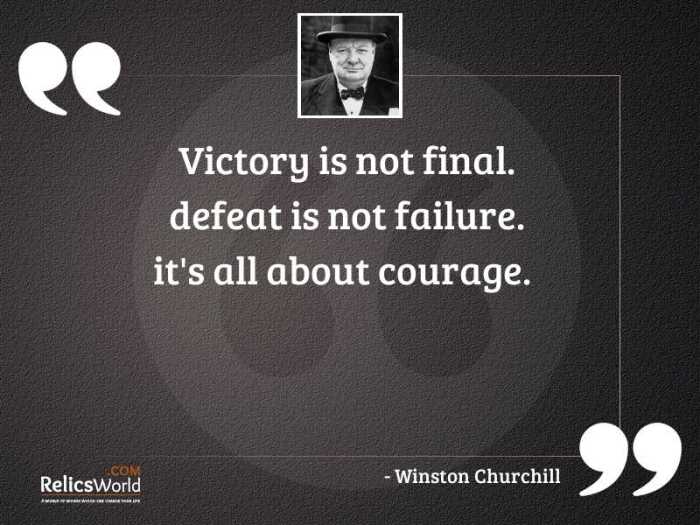What is a moral victory? This intriguing concept, often overlooked amidst the pursuit of tangible success, deserves our attention. It transcends the boundaries of traditional victories, inviting us to explore the profound impact of principled actions and ethical outcomes. Join us as we delve into the essence of moral victories, uncovering their significance, characteristics, and practical strategies for achieving them.
Throughout history, moral victories have shaped the course of events, inspiring individuals and societies to strive for justice, equality, and the greater good. From the civil rights movement to the fight against climate change, these victories have left an enduring legacy, demonstrating the power of moral purpose to overcome adversity.
Definition of Moral Victory

A moral victory is a situation in which an individual or group achieves a positive outcome, not in the traditional sense of winning or achieving a tangible goal, but rather in terms of upholding their principles, values, or sense of justice.
It involves demonstrating integrity, courage, and resilience in the face of adversity or opposition.
In sports, a moral victory may occur when a team loses a match but plays with exceptional sportsmanship, respect for the opponent, and determination. In ethics, it may involve standing up for what is right, even if it means facing negative consequences.
In politics, it may refer to a candidate who loses an election but inspires hope and change through their message and actions.
Moral victories differ from traditional victories in that they do not necessarily result in external rewards or recognition. Instead, they are internal victories that provide a sense of satisfaction, fulfillment, and a strengthened sense of purpose.
Significance of Moral Victories
Moral victories can have a profound impact on individuals, groups, and society as a whole. They can:
- Boost morale and inspire hope, even in the face of setbacks.
- Strengthen values and principles, reinforcing the importance of integrity and justice.
- Raise awareness about important issues and bring about social change.
- Foster a sense of unity and purpose, as individuals and groups come together to fight for a common cause.
Notable examples of moral victories include:
- The Montgomery Bus Boycott, a nonviolent protest that challenged racial segregation in public transportation.
- The Stonewall Riots, a series of spontaneous demonstrations that sparked the modern LGBTQ+ rights movement.
- The fall of the Berlin Wall, a symbolic victory that represented the triumph of democracy over communism.
Characteristics of Moral Victories
Moral victories are distinguished by several key characteristics:
- Upholding principles and values:They involve standing up for what is right, regardless of personal gain or recognition.
- Subjectivity:The definition of a moral victory can vary depending on individual or group values.
- Internal satisfaction:Moral victories provide a sense of fulfillment and satisfaction that is not necessarily tied to external rewards.
- Impact on others:They can inspire and motivate others to stand up for their beliefs and values.
Examples and Case Studies

Sports:
- The 1980 U.S. Olympic hockey team’s “Miracle on Ice” victory over the Soviet Union, despite ultimately losing the gold medal match.
Social movements:
- The nonviolent protests led by Martin Luther King Jr. during the Civil Rights Movement.
Personal struggles:
- Overcoming addiction or other personal challenges with perseverance and determination.
Ethical Considerations
Pursuing moral victories raises several ethical considerations:
- Balancing principles with pragmatism:Determining when to prioritize moral outcomes over more practical or tangible goals.
- Potential consequences:Considering the potential negative consequences of standing up for one’s beliefs, such as social ostracism or professional setbacks.
- Objectivity and bias:Recognizing that the definition of a moral victory can be subjective and influenced by personal biases.
Strategies for Achieving Moral Victories: What Is A Moral Victory
Individuals and organizations can employ several strategies to achieve moral victories:
- Integrity and authenticity:Adhering to one’s principles and values, even in challenging situations.
- Perseverance and resilience:Facing setbacks with determination and refusing to give up on what is right.
- Collaboration and support:Working together with others who share similar values and goals.
Cultural Perspectives

Different cultures have varying perspectives on moral victories:
- Western cultures:Often emphasize individual rights, personal integrity, and the pursuit of justice.
- Eastern cultures:May place more emphasis on collective values, harmony, and the importance of saving face.
Historical Context
The concept of moral victory has evolved over time:
- Ancient Greece:Moral victories were celebrated in athletic competitions and symbolized the pursuit of excellence.
- Medieval Europe:Moral victories were associated with religious devotion and the struggle against evil.
- Modern era:Moral victories have become increasingly associated with social justice, human rights, and the fight against oppression.
Expert Answers
What distinguishes a moral victory from a traditional victory?
A moral victory prioritizes ethical principles and values over tangible outcomes, while a traditional victory focuses solely on achieving a desired result.
Can moral victories have a lasting impact?
Yes, moral victories can inspire social change, raise awareness about important issues, and set precedents for future ethical decision-making.
How can individuals contribute to moral victories?
By acting with integrity, advocating for justice, and supporting causes that align with their values, individuals can play a vital role in achieving moral victories.
